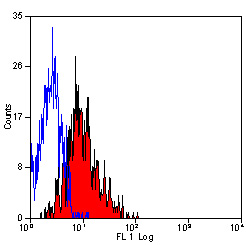CD62E (SELE) (+CD62P) Mouse Monoclonal Antibody [Clone ID: 1.2B6]
Other products for "SELE"
Specifications
| Product Data | |
| Clone Name | 1.2B6 |
| Applications | FC |
| Recommended Dilution | Flow Cytometry: Use 10 µl of neat antibody to label 1 x 10e6 cells in 100 µl. |
| Reactivities | Human, Porcine |
| Host | Mouse |
| Isotype | IgG1 |
| Clonality | Monoclonal |
| Immunogen | Human E-Selectin (ELAM-1). Spleen cells from immunised BALB/c mice were fused with cells of the NS1 mouse myeloma cell line. |
| Specificity | This antibody recognizes the CD62E and CD62P cell surface antigens. Although previously thought to recognise only Human CD62E, recent data shows that this antibody also recognizes Human CD62P, binding to a common epitope shared by these members of the selectin family. |
| Formulation | PBS, pH 7.4 containing 0.09% Sodium Azide as preservative and 1% BSA as stabilizer. Label: FITC State: Liquid purified IgG fraction. Label: Fluorescein Isothiocyanate Isomer 1 |
| Concentration | lot specific |
| Purification | Affinity Chromatography on Protein A. |
| Conjugation | FITC |
| Storage | Store the antibody undiluted at 2-8°C for one month or (in aliquots) at -20°C for longer. This product is photosensitive and should be protected from light. Avoid repeated freezing and thawing. |
| Stability | Shelf life: one year from despatch. |
| Gene Name | Homo sapiens selectin E (SELE) |
| Database Link | |
| Background | CD62P is a member of the small selectin family of cellular adhesion molecules, which also includes CD62E and CD62L. Its structure, similar to the other members of the selectin family, consists of an N terminal lectin like domain of C type, followed by an epidermal growth factor like motif, a series of short consensus repeats, a transmembrane domain, and a cytoplasmic tail. The CD62P antigen is a 140 kDa glycoprotein, located in the alpha granules and the dense granules of platelets and endothelial cells. Activation of these cells results in rapid mobilization of CD62P from the storage granules to the cell surface. Activated platelets have a stable CD62P expression, while the endothelial cells lose CD62P expression within 1 h of activation, because of endocytosis of the molecule. CD62P is also expressed on megakaryocytes, but resting platelets and endothelial cells show no surface staining of CD62P. |
| Synonyms | SELE, ELAM1, LECAM2 |
| Reference Data | |
| Protein Families | Druggable Genome, Transmembrane |
| Protein Pathways | Cell adhesion molecules (CAMs) |
Documents
| Product Manuals |
| FAQs |
{0} Product Review(s)
0 Product Review(s)
Submit review
Be the first one to submit a review
Product Citations
*Delivery time may vary from web posted schedule. Occasional delays may occur due to unforeseen
complexities in the preparation of your product. International customers may expect an additional 1-2 weeks
in shipping.






























































































































































































































































 Germany
Germany
 Japan
Japan
 United Kingdom
United Kingdom
 China
China



